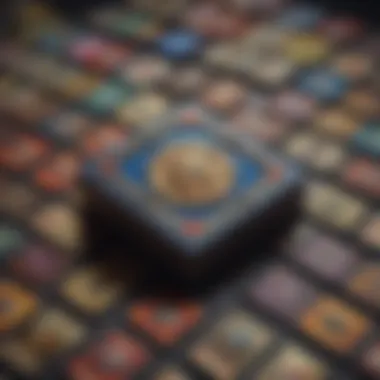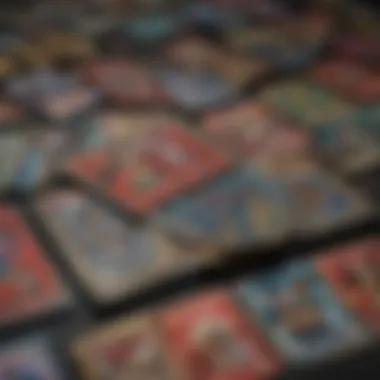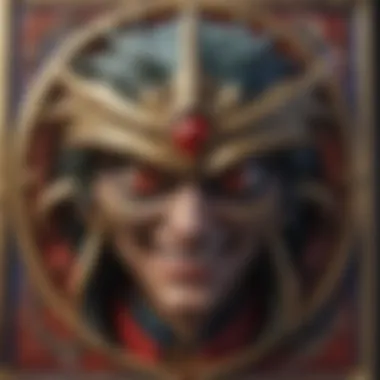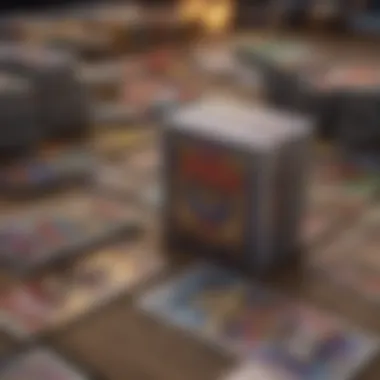Understanding Yu-Gi-Oh Card Prices: A Comprehensive Guide


Intro
Understanding the world of Yu-Gi-Oh card prices requires a multi-faceted approach, integrating various elements that sway values. Key factors include the rarity of cards, their condition, and prevailing market trends. This introduction sets the stage for a deeper exploration of these dynamics, making it possible for both casual collectors and serious players to navigate this intricate market.
Like any collectible, sentiment and demand heavily influence card prices. As players engage in the meaningful process of buying, selling, or trading cards, the value can shift dramatically. For enthusiasts, knowing how to responsibly invest in these pieces becomes a key element of enhancing their collections or decks.
A comprehensive guide can clarify the complexities surrounding these prices and empower readers with essential knowledge that improves their buying journey.
Game Feature Spotlight
Unique Gameplay Mechanics
At the core of Yu-Gi-Oh lies its innovative gameplay. Duelists utilize strategically constructed decks, engaging in battles that involve monster summoning, spells, and traps. Each of these playstyles influences the desirability and, ultimately, the price of individual cards.
For instance, cards that can alter the flow of play tend to gain traction quickly—think of iconic cards like
Market Overview
Understanding the yu-Gi-Oh card market is crucial for players and collectors alike. The landscape is complex and constantly evolving due to various influences. This overview frames the essential elements that shape the market. Price fluctuations for Yu-Gi-Oh cards can be significant. Collectors must keep this in mind when buying or selling.
Historical Context of Yu-Gi-Oh Cards
The journey of Yu-Gi-Oh cards began in the late 1990s. Originally, the cards featured characters from the manga and anime series. As the game gained popularity, production led to escalating demand. In its initial stages, cards were widely accessible, and collectors could find valuable pieces at modest prices. However, trends shifted over decades, increasing both value and demand. Some early cards have reached high valuations now. Cards showcase evolutions in design and gameplay, often affecting desirability and pricing. Thus, understanding this history gives context when examining current prices.
Current Market Trends
Currently, the market for Yu-Gi-Oh cards is characterized by fluctuations closely tied to new game releases, championship play, and internet culture. One noticeable trend is how competitive play determines prices. Cards often become highly valued shortly after being played prominently in tournaments. Additionally, online platforms have contributed to rapid price shifts, with collectors rapidly buying and selling to leverage their investments. This further complicates pricing strategies for newcomers in the market.
The following factors prominently influence card trends today:
- Online Trading Platforms: These have made auctions and trades more direct and instantaneous.
- Grading Services: Players and collectors are more aware of condition significance due to grading certifications. For example, PS has made transparency regarding card condition a priority.
- Informative Forums: Platforms like Reddit and specialized Yu-Gi-Oh community sites allow discussion on market wisdom and sharing card valuations.
Keeping up with current market trends fosters informed decisions. This creates an important edge when buying or selling.
In summary, a comprehensive understanding of this overview enables better strategies and expectations within the Yu-Gi-Oh card market.
Factors Influencing Card Prices
Understanding the factors that impact Yu-Gi-Oh card prices is essential for anyone looking to collect or invest in these cards. Prices are not just a reflection of market demand, but are conditioned by numerous elements intertwined with each card's unique story. Grasping these factors aids in making informed decisions whether you are trading, buying, or selling.
Rarity and Scarcity
Rarity plays a crucial role in determining a Yu-Gi-Oh card's market value. Generally, more rare cards tend to command higher prices. Special editions, promo cards, and narrative-critical cards tend to become highly sought after.
Scarcity is influenced by how many copies were produced. For example, a Limited Edition card released during a specific set will typically have a higher price than base-set commons that are widely available.
A card that is both rare and in-demand brings together collectors and players alike, creating a competitive environment that drives prices up.
Understanding rarity includes noting prototypes, misprints, and variants. Cards that have evident production mistakes can dramatically increase values due to novelty and uniqueness.
Card Condition and Grading Systems
The condition of a card is a pivotal aspect of pricing. Cards can range from Mint condition to Damaged, fundamentally impacting their resale value. Common grading systems, like that used by PSA, assign scores that streamline evaluating a card's condition and future desirability.


Mint cards, generally untouched and carefully stored, fetch the highest prices. Conversely, cards exhibiting wear or creasing may decrease significantly in value, often by as much as 50% or more. This serves to highlight the need for collectors to handle and store cards with utmost care.
There are professional services catering to this need warranting that the grading is as per fair industry standards. Assessing these grading details ensures buyers and sellers are on the same page, preventing disputes over value estimates.
Meta Relevance and Playability
In the competitive space of Yu-Gi-Oh, those cards that have practical meta appeal tend to maintain a higher valuation. Cards central to current or past effective strategies in gameplay can drive up demand and thus influence pricing.
Changes in meta can be attributed to new releases, ban lists, or gameplay innovations shifting the focus on certain decks. Price fluctuations in pivotal cards can occur promptly as trends shift among players. Enthusiasts should remain alert to these changes, anticipating both opportunity and risk in asset valuation.
The relationship between card effectiveness and demand amongst players creates a constantly evolving market, making understanding meta relevance important for savvy card investors.
Popularity and Demand
The popularity of a Yu-Gi-Oh card directly correlates with its demand. Cards associated with beloved characters, powerful effects, or game lore typically drive collector interest and thus, higher prices. A card that owns a widely known image or is integral to a character's narrative tends to attract both competitive players as well as casual collectors seeking connection verses pure trading value.
Watching trends observed on platforms like Reddit can provide insight into what cards are gaining traction among users, potentially influencing market prices in real-time. Social factors, including prominent player usage or streaming content featuring specific cards, also play a pivotal role in facilitating buyer interest, showcasing just how interconnected these dynamics are.
In summary, knowing the shifts in popularity combined with existing trade possibilities may enhance long-term collecting values for investors. More diligent attitudes lead to a greater potential returns in card investments.
Methods for Checking Card Prices
Understanding the methods for checking Yu-Gi-Oh card prices is crucial in navigating the complex landscapes of collecting and playing. This knowledge enables collectors to make informed decisions, minimizes the chances of losing value, and enhances the gaming experience overall. Knowing how to assess value aids in identifying desirable cards at reasonable prices while avoiding overpriced shells that hold little if any real worth.
Online Marketplaces
Online marketplaces such as eBay, TCGPlayer, and marketplaces on social media platforms, serve as a foundational resource for gaugeing Yu-Gi-Oh card prices. They allow buyers and sellers to interact on a broad scale, exposing cards currenlty listed and sold recently. By exploring these platforms, players and collectors can observe how much specific cards are fetching in real time.
It's important to filter the search by completed listings rather than just asking prices. Completed listings show actual sale prices, offering a clearer understanding of current market activity.
Consider these key points:
- Availability: More listings indicate an active demand.
- Sales Trends: Watch how often certain cards are sold.
- Price Fluctuation: Observe price changes over week or month.
Price Aggregator Websites
Price aggregator websites represent another reliable method to monitor Yu-Gi-Oh card values. Platforms like Yu-Gi-Oh Prices and CardMarket compile data from numerous sales across various retailers and auction sites, thus presenting a clearer overall picture. They often use graphical trends to visualize price movements over time.
This technique has several benefits:
- Comparative Analysis: See how a card performs against similar ones.
- Rarity Information: Helps to gauge whether to buy now or hold off.
Certain price aggregator websites may also have community features where users share insights about current market dynamics, allowing for collective wisdom to impact individual purchasing decisions.
Auction Services and Bidding Strategies
Auction websites such as Proxibid or Heritage Auctions provide a unique avenue for checking prices, distinctly based on bidding behaviors. The nature of auctions creates a pulse on what others are willing to pay, often driving prices higher than average listings realize. Here, bidding strategies become exceptionally significant.
When seeking a specific card through auctions, follow these guidelines:
- Research Past Auctions: Analyze ends of similar auctions to calcualate market great edges.
- Timing: Spend time observing lesser-known auctions for outState offers.
- Good Bidding Practice: Set a maximum price limit to avoid unnecessary spending.
By bieing strategic and informed, bidders can capitalize on opportunities to acquire valuable cards at reasonable prices while avoiding overbidded situations.


Assessing card prices does not hinge on simple algorithms; it demands interaction with the marketplaces and comprehension of trends. A coherent practice using these methods can amplify financial return while elevating your Yu-Gi-Oh collection.
Valuation Techniques
Valuation techniques are crucial in the Yu-Gi-Oh card market. Knowing how to evaluate a card's worth not only aids buyers but also helps sellers set competitive prices. When approaching the intricacies of Yu-Gi-Oh, understanding valuation means taking into account several components. These include comparative analysis, market trends, and the specific attributes that define each card’s uniqueness.
An effective valuation process can reduce the risk of poor investment decisions and enhance market knowledge. By establishing a firm grasp on how to assess a card's value accurately, one can approach the (sometimes fickle) market with confidence.
Comparative Pricing Against Similar Cards
When evaluating Yu-Gi-Oh cards, comparative pricing against similar cards provides valuable insights. This sector hinges on analyzing how cards with similar rarity, condition, and playability have been trading. By properly analyzing data from marketplaces and recent sales, you can benchmark any specific card's price more accurately.
Factors that can influence pricing comparisons include:
- Rarity: A rare card might have a high price compared to more commonly found cards.
- Condition: The physical state of the cards, often categorized as Excellent, Good, or Poor, can significantly impact pricing.
- Playability: Cards that are viable in competitive play often maintain a higher value than those that are not, at least among active players or collectors.
To carry out a comparative study, make use of websites like eBay or TCGPlayer to gather recent sales data. Observing expired listings can also provide full context on how demand fluctuates. Always aim to compare cards of similar conditions and playabilities for the most accurate assessment.
Understanding Market Trends Over Time
Sustaining an understanding of market trends is key to jugging prices in Yu-Gi-Oh collectibles. The value of cards can alter over time, often swayed by external factors like new game mechanics, player interest, or content releases. To predict card prices effectively, observing both historical data and current market behaviors is necessary.
By indexing various aspects, you should consider:
- S o l d Listings: Historical price data allows you to trace the price trajectory of certain cards over set periods.
- Card Sets Release: New card sets frequently lead to fluctuations in the values of existing cards, either inflating or deflating their worth.
- Player Community Sentiment: Online communities, such as subreddit(s) dedicated to Yu-Gi-Oh, can influence pricing through collective opinions on gauge excitement regarding certain cards.
Pivotal shifts often impact supply and demand, therefore correlation with shifts in gameplay can reveal critical data. Utilizing resources such as Wikipedia, you can gather more information on market shifts backed by facts and history.
Market sujeto is often fluid; a continuous exploration into how dynamics shift can pinpoint potential gains and pitfalls in the long run.
In summary, retraining worth through comparative and trend analysis lays the groundwork of sound investment strategies. Knowledge is key in navigating the subtle fluctuations within the Yu-Gi-Oh economy.
Common Buying Pitfalls
Understanding the common pitfalls associated with buying Yu-Gi-Oh cards is essential for both novice and seasoned collectors. Recognizing these potential traps can save you time, money, and frustration. In this section, we will address key challenges that can occur during the purchasing process, including the dangers of acquiring counterfeit product, the risk of buying cards that are overpriced, and remaining vigilant about prevalent scams that target unaware buyers.
Avoiding Counterfeit Cards
Counterfeit cards are a significant issue in the Yu-Gi-Oh market. As prices for certain rare cards rise, the incentive for individuals to create fakes also increases. Spotting a counterfeit card requires careful examination. Quality factors to consider include:
- Print Quality: Examine the text and artwork. Authentic cards maintain a certain sharpness that counterfeit copies may lack.
- Card Texture: Feel the card for an authentic texture, as many fakes are made from slicker materials.
- Holographic Elements: Genuine holographic features often show unique patterns when tilted at different angles.
By becoming familiar with these aspects, you reduce your chances of unintentionally adding a counterfeit card to your collection. Stay updated on reputable forums and resources such as reddit.com for ongoing discussions on forgery detection.
Recognizing Overpriced Cards
Not all cards are valued the same way; prices fluctuate based on market demand, condition, and many other factors. However, recognizing when a card is overpriced can be tricky. Here are strategies to help you determine fair pricing:
- Research Recent Sales: Check platforms like eBay or TCGPlayer to see what others have recently sold similar cards for.
- Trust Your Instincts: If a deal sounds too good to be true, it often is. Always seek several opinions before concluding that a price is fair.
- Consult Price Guid es: Websites often provide guidelines for the current pricing of specific cards based on recent trends in trading and sales.
Be wary of emotional decisions driven by a desire to quickly complete a collection. A calculated approach will minimize regrets after purchase.
Staying Informed on Scams and Fraud


The Yu-Gi-Oh collecting community is not devoid of scam artists. Resulting naivety can cause serious setbacks. Keeping yourself educated can form a protective wall against these threats. Key strategies include:
- Utilize Community Resources: Engage with platforms where experienced collectors share their experiences with scams.
- Report Unusual Activity: Reported fraud can protect others from encountering the same deceit.
- Scrutinization Before Transactions: Thoroughly evaluate sellers. Contact them for specific details about the cards and request images. This proactive method can uncover red flags early.
Engage actively in communities on facebook.com or alternative forums to ensure that you always receive timely updates regarding threats and scams.
"Awareness is the best protection against deceptions. Always conduct thorough research before diving into purchases."
Following these guidelines will empower you in your quest as a Yu-Gi-Oh card collector. By avoiding counterfeits, stressing fair pricing, and staying informed about scams, you bolster your capacity for making savvy purchasing decisions.
Selling Yu-Gi-Oh Cards
Selling Yu-Gi-Oh cards can be a complex but rewarding process for collectors and players alike. This section highlights essential elements, benefits, and relevant considerations regarding selling these iconic trading cards. As the demand for certain cards fluctuates, understanding the mechanics of market can not only help sellers maximize their profits but also entice buyers through accurate representations of value. Knowledge about the specifics of the marketplace directly affects both the seller's gain and the buyer's perception.
Evaluating Your Card Collection for Sale
When you're ready to sell Yu-Gi-Oh cards, evaluating your collection is the first step. This process goes beyond merely browsing your inventory; it requires careful examination of each card's condition, rarity, and market desirability.
- Condition and Grading: The state of your card can significantly impact its value. Check for scratches, creases, and wear. A well-preserved card generally fetches a higher price. Understanding grading systems, such as the Professional Sports Authenticator (PSA) or Beckett Grading Services (BGS), can help you determine how to list cards.
- Rarity: Identify which cards in your collection are rare or ultra-rare. Special editions, foils, or those marked with rarity symbols often carry more weight in the market.
- Current Trends: Keep an eye on the popularity of specific cards within the current playing meta. Cards that are highly played in tournaments are often sought after, thus enhancing their selling value.
To illustrate:
"A well-evaluated collection can command respect in both trading and reseller spaces."
This brings you not only a peace of mind but an understanding of how to position your objects of value in the marketplace.
Choosing the Right Selling Platform
Picking the appropriate selling platform can dramatically affect your card sale success. Various options exist, each with its specific advantages and challenges. Here are popular venues for selling Yu-Gi-Oh cards:
- Online Marketplaces: Platforms such as eBay or TCGPlayer allow you to reach a broader audience. Make sure your pricing is competitive and lists all relevant details of the cards.
- Local Game Stores: Partnering with local shops can be beneficial. Many stores buy cards directly or facilitate consignment sales.
- Social Media Platforms: Groups on Facebook or Reddit specific to Yu-Gi-Oh trading can provide a direct line to buyers who are interested. Understanding group rules is crucial in these settings.
While selecting a selling platform, consider transaction fees, shipping requirements, and your target audience's preferences. Aligning all these aspects correctly can result in a smoother transaction process and greater returns from your sales.
Final Considerations
The Final Considerations section serves as a crucial analysis point, summarizing key insights gathered throughout this guide. Understanding the significance of valuing Yu-Gi-Oh cards is paramount for both collectors and players alike. This is not just about possessing cards; it's about making well-informed investment decisions that can lead to significant rewards.
Some specific elements worth noting include:
- Developing a strategy tailored to card valuation
- Acknowledging changing market dynamics
For a collector, these elements do not just facilitate better choices; they pave the way to cultivating a rewarding collection that truly reflects both individual taste and market truths.
Developing a Personal Pricing Strategy
Crafting a personal pricing strategy involves considering various factors that influence the value of Yu-Gi-Oh cards. First, collectors must recognize their own goals: Is it purely for enjoyment, potential profit, or competitive advantage? Understanding this helps shape approaches for valuation.
Key steps in bolstering your strategy include:
- Researching Rarity: Knowing the rarity of each card provides a baseline for pricing.
- Evaluating Market Trends: Using historical data to monitor how prices fluctuate can guide future investments.
- Monitoring Personal Collection Value: Keep a regular check on the current worth of your cards, especially regarding those that become important in competitive player tend.
- Setting Price Libel: Take personal satisfaction into account; sometimes, sentimental value alters how much a collection is worth.
Adjust your pricing strategy as needed because collecting cards is dynamic. It reflects broader shifts in interests and pricing structures.
Continuous Research and Market Monitoring
Engaging in ongoing research and market monitoring cannot be overstated in ensuring a solid foothold in the Yu-Gi-Oh economy. The card market is fluid; trends emerge and fade away often. To stay informed:
- Subscribe to relevant online forums or platforms such as reddit.com for real-time market chats and insights from other collectors.
- Follow online marketplaces and auction sites to get a feel for price averages.
- Use tools or apps literals for tracking card values, helping to keep your strategy up-to-date.
Investing the necessary time into continuous research arms you with knowledge. This knowledge translates into smart choices and informed discussion among peers. ** Your foresight lowers the risks commonly associated with buying and selling Yu-Gi-Oh cards.**







